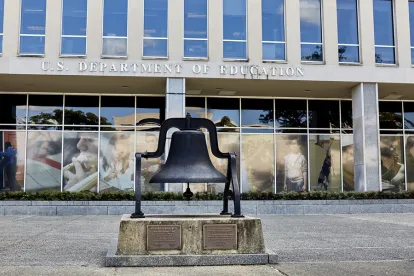On December 19, 2016, the U.S. Department of Education (the “Department”) published final regulations (the “Final Rule”) regarding State authorization of postsecondary distance education as well as foreign locations of domestic institutions. The Final Rule also establishes numerous new disclosure requirements for distance education programs, including those offered by institutions participating in State authorization reciprocity agreements. The Final Rule, as published in the Federal Register and having an effective date of July 1, 2018, may be viewed here.
Below is a summary of the Final Rule’s various components, which remain subject to our continued review.
State Authorization of Distance Education
The Final Rule amends the Department’s regulations at 34 CFR § 600.9 to require institutions participating in the Title IV federal student aid programs, and offering postsecondary education through online distance or correspondence courses, to be authorized by each State in which any student is enrolled if the State itself requires such authorization. If an institution does not have such required authorization in a State, any distance education students residing in that State may not receive Title IV federal student aid.
The Final Rule acknowledges State authorization reciprocity agreements, which have been developed among States to reduce institutional burdens associated with obtaining postsecondary authorization in multiple jurisdictions for distance education programs, as a means of satisfying the Title IV program requirement. An institution must be able to document its approval under a State authorization reciprocity agreement, upon the Department’s request, if it does not have a stand-alone authorization in any State where it enrolls distance education students.
However, the Final Rule also provides that a State authorization reciprocity agreement may not prevent a State from enforcing its own laws. In a notable change from the proposed regulations, the Final Rule requires that any State authorization reciprocity agreement (in order to be accepted by the Department for Title IV program purposes) must permit all States that are parties to the agreement to enforce all generally applicable laws, not only those specifically related to consumer protection or directed at educational institutions. This means that an institution subject to a State authorization reciprocity agreement must remain mindful of, and allocate appropriate resources to, maintaining compliance with all laws of any State in which it enrolls even a single distance education student.
Under the Final Rule, institutions offering distance or correspondence education must also document and confirm that in every State in which enrolled students reside, there exists an adequate process for the review of, and potential for action upon, student complaints. An institution may, in the alternative, document that an applicable reciprocity agreement designates such a process either through the student’s home State or through the State in which the institution’s main campus is located.
Although several commenters to the proposed rule apparently expressed concern about the mobile nature of many distance education students, particularly students in the military, the Final Rule effectively creates new obligations for institutions to determine an online student’s State of legal residence – as contrasted with the State where a student may be physically located – and to proactively inform online students of the potential consequences on their receipt of Title IV aid if they change legal residence to another State. Specifically, the Final Rule requires institutions to publicly disclose the consequences of a student’s moving to a State where (i) the institution does not satisfy State authorization requirements or (ii) if the student is enrolled in a gainful employment program, if the program does not meet the destination State’s occupational licensure or certification requirements. Institutions must therefore have a means to confirm a distance education student’s legal State of residence, which may differ from the student’s current physical address, during the student’s entire period of enrollment in order to ensure the student’s continued eligibility for Title IV aid.
Importantly, these state authorization requirements also affect the scope of an institution’s required gainful employment program certifications. Those gainful employment program certifications include, among other things, whether a program (i) is programmatically accredited, if required by a Federal governmental entity or required by a governmental entity in the State in which the institution is located or in which the institution is otherwise required to obtain State approval; and (ii) satisfies the applicable educational prerequisites for professional licensure or certification requirements in that State so that a student who completes the program and seeks employment in that State qualifies to take any licensure or certification exam that is needed for the student to practice or find employment in an occupation that the program prepares students to enter. These two aspects of the gainful employment program certifications are based on the States in which an institution is required to be authorized under 34 CFR § 600.9, which presently includes only States where an institution has physical locations but is expanded under the Final Rule to include any State where an institution enrolls distance education students.
Finally, recognizing that many educational programs offer classroom components entirely online but also include in-person internships or practicums, the Final Rule makes certain regulatory changes to include such programs that contain an in-person internship or practicum in all of the above-described state authorization and disclosure requirements.
New Public and Individual Disclosure Requirements for Distance Education Programs
Under the Final Rule, institutions must make public certain information regarding their distance education programs. Other information must be disclosed directly to enrolled and prospective students. Among the required public disclosures are the following:
-
Whether the program is specifically authorized by the State in which students reside, or through a State authorization reciprocity agreement;
-
The consequences of a students moving to a State where the school does not meet State authorization requirements, or where a student’s gainful employment program does not meet the destination State’s occupational licensure or certification provisions;
-
The process and contact information for submitting consumer complaints to the State in which the institution’s main campus is located, or the process set out by the State authorization reciprocity agreement, if applicable;
-
The process and contact information for submitting consumer complaints to the student’s State of legal residence;
-
The refund policies required by any State in which enrolled students reside;
-
For each State in which enrolled students reside, as well as any other State for which the institution has made this determination, the applicable licensure or certification requirements for the occupation for which the program prepares students to enter, and whether the program meets those requirements; and
-
Any adverse actions taken within the last five years by a State or accrediting agency against an institution’s distance education program or correspondence course, and the year in which the action was initiated. In explaining this particular disclosure requirement, the Department noted that adverse actions include any official finding for which an institution can appeal an administrative or judicial review, any penalty against an institution including a restriction on an institution’s State approval, the initiation of a civil or criminal legal proceeding, or any settlement of a legal proceeding initiated by a State entity regardless of whether the institution had to admit to any wrongdoing.
The Final Rule also requires the following individual disclosures:
-
To each prospective student, prior to enrollment, any determination by the institution that the program does not meet occupational licensure or certification requirements in the student’s State of residence. If a prospective student receiving this disclosure chooses to enroll in the program, the school must obtain an acknowledgement that the student received the disclosure and must be able to demonstrate such receipt to the Department;
-
To each enrolled and prospective student, within 30 days of its occurrence, any adverse action initiated by a State or accrediting agency relating to the institution’s distance education programs; and
-
To each enrolled and prospective student, and within 14 days of its conclusion, any determination by the institution that the program ceases to meet the licensure or certification requirements of a State.
State Authorization of Foreign Branches and Additional Locations
The Final Rule also expands the authorization requirements for Title IV program eligibility of any domestic institution’s foreign branch campuses or additional locations. If a domestic institution’s foreign location offers 50 percent of more of any educational program, the Final Rule requires that the location be authorized to operate by an appropriate government authority of the foreign country in which it is located. The institution also must be able to demonstrate such authorization to the Department. (As one exception to this new requirement, a domestic institution’s foreign branch or additional location on a U.S. military base does not require such authorization, but must be included within the scope of the institution’s accreditation.)
The Department’s regulation also requires that foreign branch campuses or additional locations be reported to an institution’s home State (the State in which its main campus is located) on at least an annual basis, and more frequently if the State so requires. Additionally, if the institution’s home State limits the institution’s authorization so as to exclude any foreign branch campus or additional location, the foreign campus or location will be not considered legally authorized for Title IV program purposes. Also, in addition to the disclosure requirements enumerated above, any foreign or branch campuses for which students receive Title IV federal student aid funds for attendance must inform enrolled and prospective students of the applicable complaint process.
As noted above, the effective date of this Final Rule is July 1, 2018. We will continue to monitor any developments in this area.





 />i
/>i

